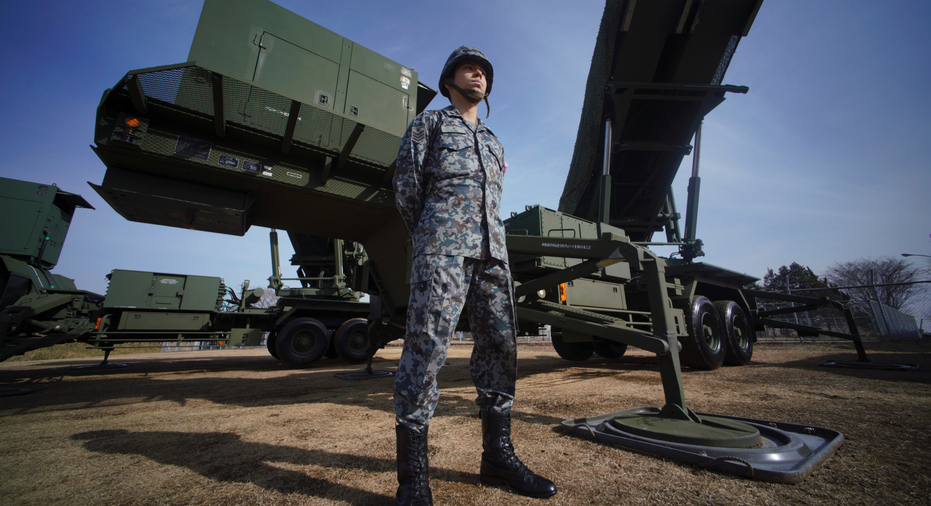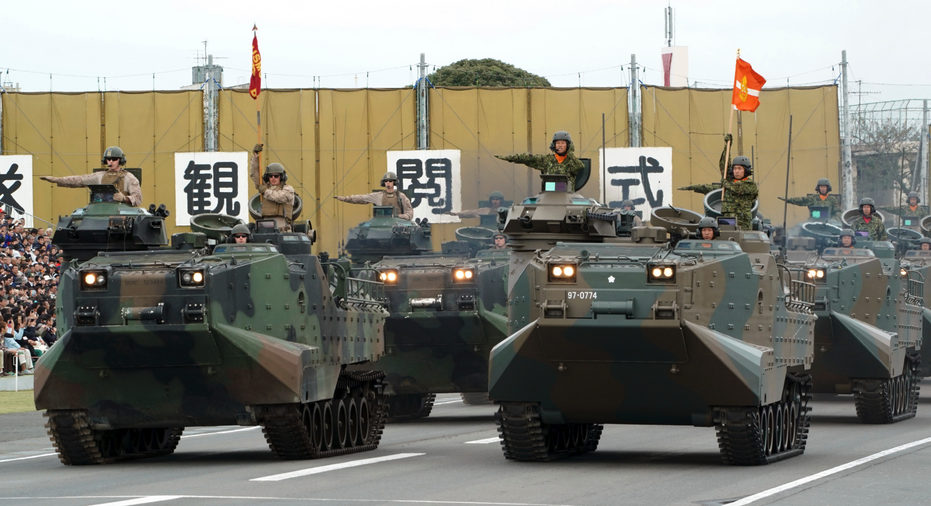Japan Cabinet OKs record defense budget bill, US arms buys
FILE - In this Jan. 18, 2018, file photo, a member of the Japan Ground Self-Defense Force stands guard next to a surface-to-air Patriot Advanced Capability-3 (PAC-3) missile interceptor launcher vehicle at Narashino Exercise Area in Funabashi, east of Tokyo. Japan's Cabinet has approved a record 5.26 trillion yen ($47 billion) defense budget as the country seeks to bolster its arms capability by increasingly buying advanced U.S. weapons. The budget plan endorsed Friday, Dec. 21 rises 1. 3 percent from the previous year, a seventh annual increase since Prime Minister Shinzo Abe took office in 2012. (AP Photo/Eugene Hoshiko, File)
TOKYO – Japan's Cabinet approved a record 5.26 trillion yen ($47 billion) defense budget Friday as the country seeks to bolster its arms capability by increasingly buying advanced U.S. weapons.
The budget plan endorsed by Prime Minister Shinzo Abe's Cabinet rises 1. 3 percent from the previous year, a seventh annual increase since Abe took office in 2012.
The defense spending is part of the 101 trillion yen ($910 billion) national budget for 2019 and still needs to be approved by the parliament when it resumes early next year. It's also the first of Japan's 27.5 trillion yen ($250 billion) five-year midterm plan released Tuesday under defense guidelines designed to bolster Japan's defenses amid potential threats from North Korea and China.
Japan stresses the worsening security environment, saying Japan needs to maintain superiority and deterrence amid China's increasingly assertive maritime activity in the regional seas. The country says North Korea's missile and nuclear capability remains threatening as diplomatic efforts to denuclearize the Korean Peninsula have stalled.
Japan's U.S. arms purchases have surged in recent years. Buying more American arms equipment helps to reduce U.S. trade deficit as Japan has increasingly come under Trump's heavy pressure to do so. But it would set back Japan's fledgling defense industry.
The budget plan set aside 175.7 billion yen ($1.58 billion) to prepare for a planned deployment of a pair of Aegis Ashore, the U.S.-developed land-based missile interceptors in fiscal 2023. Japan also plans to spend 68.1 billion yen ($613 million) to buy six F-35A fighter jets from the U.S., as well as an early-warning aircraft E-2D that cost 194 billion yen ($1.75 billion).
The budget plan includes 70 million yen ($630,000) just to research plans to refit a helicopter carrier into Japan's first aircraft carrier, which could carry American F-35B stealth fighters capable of short takeoffs and vertical landings.
Having aircraft carriers would be a major shift to Japan's postwar naval defense. Critics say the ships' strike capability would violate Japanese war-renouncing constitution.
The budget also allocates 22.3 billion yen ($20 million) to beef up a specialized cyberdefense unit.
Critics of the country's defense spending say Japan should spend more money on elder care and welfare since it has a fast-aging and declining population and fewer people in its workforce. The Defense Ministry will accept more women into the self-defense force, postpone retirement age and promote research and development of robotics and unmanned equipment.
___
Follow Mari Yamaguchi on Twitter at https://www.twitter.com/mariyamaguchi





















